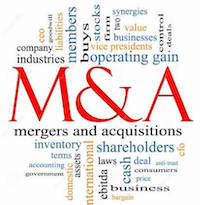News
Sympathy for 'Refinitivees' - from the FT
Monday 16 September 2019

Refinitiv staff deserve sympathy for being stung after bosses cracked the merger and acquisition whip, a Financial Times columnist wrote on Monday.
Big corporate mergers take a hidden toll on staff, and many deals take no account of the extreme human cost in disruption and anxiety, M&A columnist Andrew Hill wrote.
“Plenty of ordinary workers deserve sympathy but this week mine is reserved for staff at Refinitiv,” he wrote.
“Until October last year, Refinitiv was the trading and data business of Thomson Reuters. The division’s rebrand after last year’s leveraged buyout by Blackstone was celebrated by one over-enthusiastic ‘Refinitivee’ in a rap that included the immortal line: ‘It’s like a Fintech and a Spaceship got together and mated.’
“The coupling has continued. In August, the London Stock Exchange Group agreed to buy the company, but last week Hong Kong Stock Exchanges and Clearing butted in with its own bid for the LSE. Eschewing the fintech/spaceship analogy, HKEX’s chief executive instead likened the possible partnership to a ‘Romeo and Juliet story’ - one which would exclude the Refinitivees.
“They are only the latest staff to be stung after bosses crack the merger and acquisition whip. Much M&A still fails. Some 49 per cent of acquirers underperformed between 2016 and 2018, according to Cass Business School’s M&A Research Centre. That is an improvement on the 1990s, but still woeful, and currently getting worse. It is one reason consultants, bankers and academics vie to tell deal-hungry leaders how to join the 51 per cent.”
Staff uncertainty remains an important obstacle to successful dealmaking, according to Nuno Fernandes of IESE Business School, Barcelona.
“When the Financial Times was taken over in 2015, we endured just half a day of wild rumours about bids and counterbids, before Nikkei was announced as our new owner,” Hill wrote.
Many employees are forced to wait while antitrust regulators scrutinise deals, with only the dreaded merger “synergies” - often shorthand for job losses - to look forward to.
Scott Moeller of Cass says some staff “check out completely, some gather around the water-cooler, some are spending all the time polishing their CVs and interviewing [for other jobs], and some are so stressed they just call in sick.”
Quantifying the impact of this uncertainty is hard. Studies cite one estimate that an average 5.7-hour chunk of productive work in an eight-hour day drops to less than an hour during a change of control.
Fernandes estimates employees’ attention to their work drops by 60 or 70 per cent as they are assailed by gossip and hearsay during a bid. This could be compounded by “self-centred behaviours, mental and physical illness and lack of motivation” triggered by prolonged bid-related anxiety. Hence, the imperative for quick and clear communication from the top.
The theory is that the M&A machine advances for the greater good of the whole economy, oiled by cost savings and revenue improvements, Hill wrote. “I can’t help thinking, though, that if executives devoted more effort to addressing the human uncertainty it also generates, they would soon see an increase in the persistently low proportion of successful deals.” ■
- SOURCE
- Financial Times
- « Previous
- Next »
- 377 of 2176